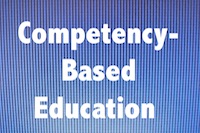An evaluation of competency-based education programs: A study of the development process of competency-based programs
 Competency-based education (CBE) has already shifted dramatically across the landscape of higher education. As a result of the Department of Education’s Experimental Sites Program announcement in 2013 (Baker, 2013), several universities and colleges were given the opportunity to allow students to achieve college credits through competency-based assessments. CBE is expected to broaden access to higher education by assessing student-based workforce ready skills. Once competency is demonstrated, students will earn class credit which leads to a culmination of benefits such as lower tuition costs, flexible schedules, and shorter time until graduation. These changes align directly with The United States Administration’s goals to create a more accessible and lower cost higher education for students. The number of CBE programs is expected to rise over the next 18 months, due in-part to the Department of Education’s Experimental Sites program. However, although 65 colleges have decided to participate in the experiment, there is little research published on best practices to build a competency-based program that provides clear, valid, and defendable assessments; content that will remediate skill or knowledge gaps; or methods in which student and program success is ultimately measured. This study explores current practices for the development of CBE programs in an effort to identify common, effective practices.
Competency-based education (CBE) has already shifted dramatically across the landscape of higher education. As a result of the Department of Education’s Experimental Sites Program announcement in 2013 (Baker, 2013), several universities and colleges were given the opportunity to allow students to achieve college credits through competency-based assessments. CBE is expected to broaden access to higher education by assessing student-based workforce ready skills. Once competency is demonstrated, students will earn class credit which leads to a culmination of benefits such as lower tuition costs, flexible schedules, and shorter time until graduation. These changes align directly with The United States Administration’s goals to create a more accessible and lower cost higher education for students. The number of CBE programs is expected to rise over the next 18 months, due in-part to the Department of Education’s Experimental Sites program. However, although 65 colleges have decided to participate in the experiment, there is little research published on best practices to build a competency-based program that provides clear, valid, and defendable assessments; content that will remediate skill or knowledge gaps; or methods in which student and program success is ultimately measured. This study explores current practices for the development of CBE programs in an effort to identify common, effective practices.







